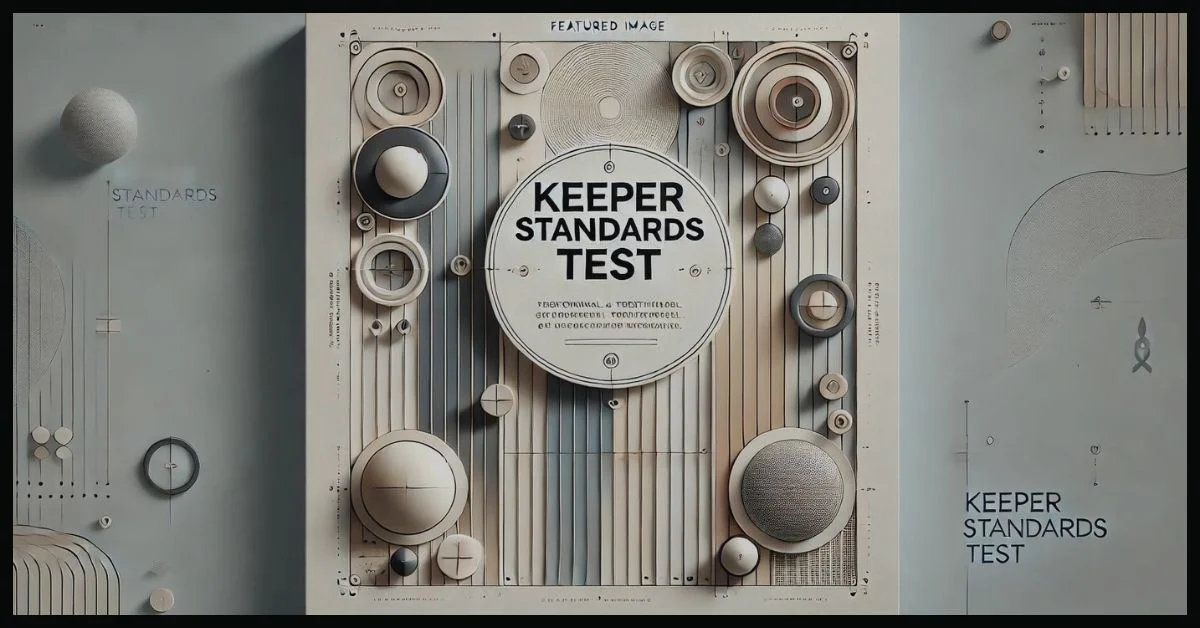The Keeper Standard Test is essential for individuals interested in specific professional or academic opportunities. This guide will walk you through everything you need to know, including what to expect, study materials, and preparation tips, to help you succeed.
What is the Keeper Standard Test?
The Keeper Standard Test is a comprehensive assessment used to measure the capabilities and readiness of individuals in various fields. It evaluates a range of skills, including analytical thinking, problem-solving, and practical knowledge.
For many, the Keeper Standard Test is a stepping stone toward professional certifications or academic advancements. Since this test is essential in certain industries, understanding its format, content, and structure can significantly influence one’s performance.
Study Materials for the Keeper Standard Test
Preparing for the Keeper Standard Test requires strategic study and access to the right resources. There are several types of study materials available, including:
- Official Study Guides: These guides provide a complete overview of the topics and skills tested.
- Practice Tests: Taking practice tests can help you get familiar with the format and question types.
- Online Courses: Many platforms offer courses tailored to the Keeper Standard Test, covering essential topics and offering tips from experienced instructors.
Combining these materials will help build a solid foundation and increase your confidence on test day.
What to Expect on Keeper Standard Test Day
On the test day, you can expect a structured and regulated environment. The test will include multiple-choice questions, practical scenarios, and problem-solving exercises. Here are some critical aspects of the test day experience:

- Test Duration: The test typically lasts several hours, so be prepared to stay focused for an extended period.
- Testing Environment: You’ll be seated in a quiet room with minimal distractions, often monitored to ensure a fair testing process.
- What to Bring: Most testing centers allow you to bring necessary identification, approved calculators, and basic stationery.
Being familiar with these details will help you feel more at ease and focused on the day of the test.
Keeper Standard Test: Scoring Explained
The Keeper Standard Test uses a standardized scoring system, with points awarded for correct answers. Understanding how the scoring works is vital to focusing your efforts during preparation. Higher scores may open up more opportunities and can serve as a benchmark of your skill level.
Time Management During the Test
Time management is crucial during the Keeper Standard Test. With a limited time frame to answer all questions, practicing pacing and prioritizing questions will ensure you can tackle every part of the test without rushing.
Staying Calm and Focused
Test anxiety is common, but staying calm and focused can make a big difference. Practicing relaxation techniques and deep breathing exercises before and during the test can help maintain your composure.
Common Mistakes to Avoid
Several common mistakes can hinder your performance on the Keeper Standard Test. Here are a few pitfalls to watch out for:
- Skipping Practice Tests: Without practice tests, you may be unprepared for the question formats.
- Ignoring Test Instructions: Failing to carefully read instructions can lead to errors and lost points.
- Poor Time Management: Spending too much time on one question can leave you with less time for others, negatively impacting your score.
By being aware of these mistakes, you can avoid them and perform more confidently on the test day.
Why Do People Take the Keeper Standard Test?
People take the Keeper Standard Test for various reasons. For some, it’s a prerequisite for professional qualifications. For others, it’s a requirement for advanced educational programs. The test serves as a benchmark to assess one’s skills and readiness for specialized roles in industries where precision and competency are vital.
Additionally, the Keeper Standard Test is often seen as a way to enhance credibility and show employers or academic institutions your commitment and ability to succeed.
How to Prepare for the Keeper Standard Test
Preparation is essential for success on the Keeper Standard Test. Here are some effective strategies to consider:

- Create a Study Schedule: Allocate regular time for studying, and focus on different topics each session to avoid burnout.
- Take Regular Practice Tests: These tests can help you understand your strengths and weaknesses.
- Join Study Groups: Learning with others can provide motivation and new insights into challenging topics.
Preparing effectively for the Keeper Standard Test involves using all available resources and practicing consistently.
Keeper Standard Test: Scoring Explained
Scoring on the Keeper Standard Test depends on accuracy and the number of correct answers. Familiarize yourself with the scoring rubric to understand how each section is weighted and to strategize your approach accordingly.
Tips for Passing the Keeper Standard Test
Here are some tips to help you pass the Keeper Standard Test:
- Start Studying Early: Give yourself plenty of time to review all materials and practice thoroughly.
- Focus on Weak Areas: Identify your weakest topics early and prioritize these in your study sessions.
- Take Care of Yourself: Get plenty of sleep, eat well, and exercise leading up to the test for optimal mental performance.
Keeper Standard Test Requirements
To take the Keeper Standard Test, you typically need to meet specific eligibility criteria, which may include educational prerequisites or work experience in a related field. Be sure to check the exact requirements for the test to ensure you are prepared.
Keeper Standard Test vs Other Tests
The Keeper Standard Test differs from other standardized tests because it focuses on specific industry knowledge and practical skills. While tests like the SAT or GRE measure general aptitude, the Keeper Standard Test evaluates a candidate’s proficiency in targeted areas, making it more specialized.
The Bottom Line
The Keeper Standard Test is a vital assessment for individuals pursuing careers or educational paths that require specialized skills and knowledge. By understanding the test format, avoiding common mistakes, and preparing effectively, you can enhance your chances of success. Whether you’re taking it for career advancement or academic reasons, a well-rounded preparation strategy is key to achieving a high score.












